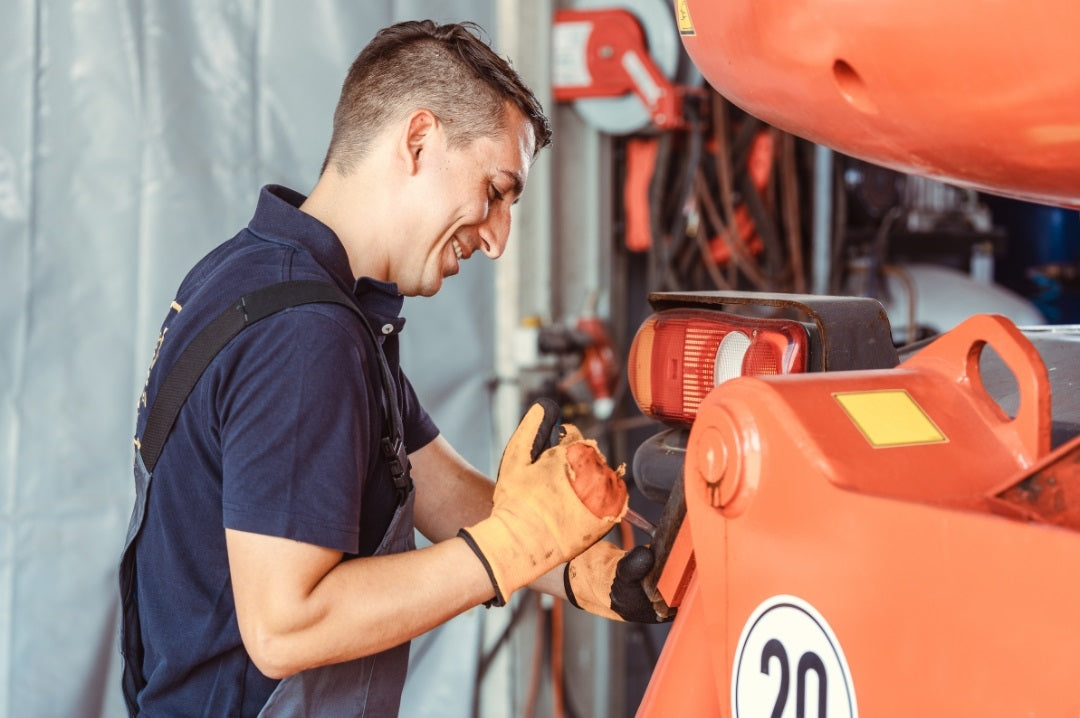Some Common Mini Machinery Problems You can face and How to fix Them
Why does mini machinery wear out and break down? Here are the common construction machinery problems and methods to avoid them.
1. Hydraulics
Materials like water, dust, metal, and mud proliferate during construction processes. They can enter into the hydraulic system and cause serious issues.
Water and other particles can enter the system in several ways. They can gather within the system during operation, passing through wear and tear on the seals or from broken edges. Debris from the project environment can also pass through leaks & openings.
If the hydraulic system is not properly flushed out, these passing particles can cause functional errors or a breakdown. Even very small amounts of contaminants can gradually degrade fluids. Low fluid levels can decrease viscosity, reduce machinery's load-bearing capacity, and ultimately create a complete breakdown of these components when left unaddressed.
A proper & periodical fluid inspection can examine the origin of hydraulic system contamination. Maintenance is also a must to keep these contaminations at bay. Change dirty, jammed, or damaged hydraulic filters, and regularly oil and lube your machine to avoid hydraulic pump issues.
2. Electrical Failure
Electrical faults are one of the most stubborn mini-machinery issues. Several factors can cause electrical failure in mini equipment, such as:
Loose power connections: A loose electrical connection can cause an electric arc, where a current springs from one side to another. This can cause sparks, or even cause an electrical fire.
Contaminants: Environmental Contaminants like dust, moisture, and humidity are common causes of electrical malfunction.
Insulation issues: inappropriate or low-quality insulation can cause electrical problems. And can cause leaks which can overload the electrical system, later on causing overheating and damaging the electronic parts. This can reduce equipment performance and increase the risk of a fire.
Power overload: Electrical circuit overload starts when more than normal electricity passes through one part of the circuit. It can also start when something in the circuit hinders electricity flow. Power overload can lead to various issues, such as a damaged fuse, tripped breaker, or electrical fire.
Complete safety training, risk examination, voltage regulators, and high-quality cord insulation are all important measures. Regular & Periodic equipment maintenance can also minimize dust & dirt buildup that later on causes electrical issues.
3. Undercarriage Maintenance
A proper undercarriage maintenance is essential to maintain the stability, performance, and longevity of your construction machinery. However, it is frequently exposed to tough operating conditions, making it a great risk of damage and failure. Such as mining sites and other corrosive environments can worsen undercarriage components, decreasing performance, and life span.
Aside from natural wear and tear, here are some other reasons for undercarriage damages:
Fluid Leakage: Oil or hydraulic fluid leakage can start in bearings, seals, and gaskets. Leakage can decrease performance and damage other components if left leaked.
Damaged tracks: Impacts from rough terrain, rocks, and other materials can tear and puncture track rubber. A damaged Track can significantly decrease equipment stability and traction.
Misalignment: Misaligned undercarriage components can result from uneven loading, irregular tensioning, and other factors. They can lead to impulsive failure.
inadequate lubrication: Pathetic lubrication can cause friction and wear, later on damaging the undercarriage. Proper lubrication is vital for a smooth undercarriage.
Overloading: Overloading the machinery can stress the undercarriage parts. Be sure to follow the manufacturer-recommended load-bearing limits to prevent this issue.
Try to reduce these conditions as much as possible or consider them into a preventive maintenance period.
4. Metal Corrosion
Properly examine and maintain your machinery to prevent corrosion.
Corrosion and rust are the main causes of machinery malfunction, especially for job sites in humid areas or those near lakes rivers, or the sea. Lubricant oxidation can create organic acids in metals like zinc & iron, giving rise to corrode. Corrosion can break seals and other metal parts over time.
Proper & Periodic maintenance can help prevent corrosion-related fatigue and breakdowns. Weekly inspections can help detect metal corrosion in machinery early on. So that you can replace these parts well before they cause more severe issues. You may also use rust and corrosion inhibitors to reduce contact between metal surfaces and corrosive materials like water, salt, & oxygen.
With the right tools, quick fixes, and high-quality spare parts from newexcavatorforsale.com, you can keep your mini machinery running smoothly and reduce costly downtimes. Explore our selection of durable, affordable spare parts designed to fit various machinery models. Trust newexcavatorforsale.com for all your mini machinery maintenance needs!

